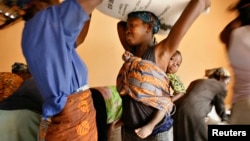A new initiative has been launched to increase food security for small holder farmers in five regions in Ghana. The initiative - ICT Challenge – is a partnership between the Grameen Foundation, Farm Radio International and Digital Green.
Using extension agents, mobile apps, radio, video, text messaging and voice messages, the project will provide farmers with the information and support needed to adopt technology that increases their productivity and improves nutrition in their communities.
ICT Challenge is part of the New Alliance ICT Extension Challenge Fund, a component of the New Alliance for Food Security and Nutrition.
Food security is the target
“We are focused on increasing food security for smallholder farmers in Ghana using a number of different channels to reach farmers with vital information that they need in order to drive productivity and ultimately increase income,” said Hillary Miller-Wise, who oversees the Grameen Foundation’s portfolio across sub-Saharan Africa.
She said the three organizations will develop mobile applications, and leverage radio to reach farmers in five regions in central and southern Ghana.
Farm Radio International and Digital Green will help local institutions develop content on agricultural best practices and other relevant topics for distribution to 200,000 farming households in the Ashante, Brong Ahafo, Central, Eastern and Volta regions.
Farm Radio International is a Canadian charity that harnesses the power of radio to meet the needs of small-scale farmers. They work with more than 570 radio stations located in 38 African countries to fight poverty and food insecurity.
Digital Green uses an innovative digital platform for community engagement to improve livelihoods of rural communities across South Asia and Sub-Saharan Africa.
Ghana has a problem to solve
Although more than half of the labor force in Ghana earns income through agriculture, The World Food Program (WFP) classifies the West African nation as a food-deficient country. According to the WFP, almost half the children under five suffer from malnutrition.
Miller-Wise said the partnership is an opportunity for the three organizations to reach as many farmers as possible.
Mobile penetration is high in many countries and 60 percent of Ghana’s population owns mobile phones, she said, but “when you get to rural areas, mobile penetration can be quite spotty both in terms of ownership as well as access to a signal.”
A model solution for other countries
The ICT Challenge plans to work through the existing networks of extension services, she said.
“Once we prove the model in Ghana”, she continued, “…we absolutely have the intention to extend to other countries… to reach small holder farmers with the kind of information that drives productivity.”
Miller-Wise said it will take about two years for these technological innovations to meet their goals.
“Our hope is that we will be able to continue to operate with the commercial partners in Ghana for several years,” she said. That will give the ICT Challenge time to strengthen the program and identify other markets they can serve.
Grameen Foundation was founded in 1997 as a global non-profit organization to helps the world’s poorest people achieve their full potential with åessential financial services and information on health and agriculture that can transform their lives.




